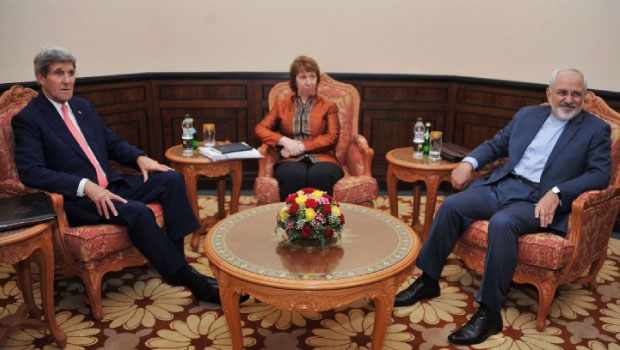 US Secretary of State John Kerry, EU Special Representative Catherine Ashton and Iran Foreign Minister Mohammad Javad Zarif on the second day of talks in Muscat on Monday. Photo-ONA[/caption]
US Secretary of State John Kerry, EU Special Representative Catherine Ashton and Iran Foreign Minister Mohammad Javad Zarif on the second day of talks in Muscat on Monday. Photo-ONA[/caption]Muscat:�After two long days of deep discussions on Iran's nuclear accord, US Secretary of State John Kerry, Iran's Foreign Minister Mohammad Javad Zarif and European Union Special Representative Catherine Ashton emerged from trilateral talks still in search of a final agreement.
The trilateral talks wrapped up shortly after 8:30pm on Monday night, and then Ashton and Zarif met for one more meeting. But as US president Barack Obama said on Sunday, there were "big gaps" that the negotiators were attempting to fill during the talks in Muscat.
Earlier in the evening Kerry told photographers ""We are working hard. We are working hard."
His Iranian counterpart, Zarif, was quoted saying� "We will eventually," when asked if they were making progress.
Despite their optimism, by the end of the trilateral talks, the speculation in Muscat was that while several points had been agreed upon, there was still no sign of that comprehensive agreement, even after four long rounds of discussion.
Some of the main issues at hand include the number of uranium enrichment facilities Iran will be allowed to operate, reducing sanctions on Iran and creating a timeline for a new treaty.
Currently Iran has 19000 centrifuges but the Western powers would like this number greatly reduced.
At issue are the lifting of sanctions, too, with the Iranians hoping for an immediate removal, and the West looking for a gradual easing of the economic restrictions. The discussions have also included a time frame for a new agreement, with the Western powers looking for a treaty of at least 10 years and the Iranians aiming for five to seven years.
These talks, facilitated by the Sultanate of Oman, were part of the 9th round of negotiations. They came ahead of the November 24 deadline to reach an agreement which would see Iran reducing its nuclear capabilities in exchange for the West lifting more of its economic sanctions against Iran.
The previous agreement, which went into effect in January saw Iran agreeing to limit some of its nuclear activities in exchange for an easing of the existing sanctions that the US and its allies have against Iran.
Iran denies that its nuclear ambitions are for anything other than energy, while the US and its allies worry that Iran is trying to build nuclear weapons.
Although the results of the talks in Muscat fell short of the high hopes, Oman's role was still appreciated. Before the talks began behind closed doors on Sunday morning, Kerry took a moment to acknowledge the role the Sultanate has played hosting these talks and mediating between the USA and Iran before.
"I just want to thank His Majesty Sultan Qaboos and I want to thank the foreign minister and all Omanis for hosting all of us here, for their very generous welcome, and for the role they have played in helping to bring parties together in order to be able to have these negotiations. They have done a outstanding job, and we are very, very grateful to you. And I hope you will convey the best wishes of the American people and President Obama to His Majesty," Kerry said.
After the talks finished Iran's ambassador to Oman, Ali Akbar Sibeveih, also spoke briefly to the press and thanked Oman for hosting the talks.
The negotiations will continue today with the P5+1 - France, Britain, the United States, Russia, and China, which are the five permanent members of the United Nations Security Council, plus Germany - with Catherine Ashton.
The talks will resume in Geneva on November 18, with the hope that a deal will be reached by the November 24 deadline, achieving a goal that couldn't be met here in Muscat.
By Times Of Oman
The Iran Project is not responsible for the content of quoted articles.











